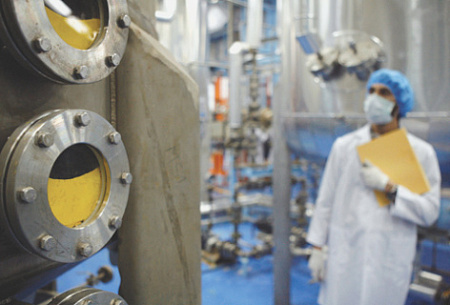
Iran has proposed to the United States to form a consortium of Middle Eastern countries that would enrich uranium for civilian purposes. The initiative presented to American diplomats during the last, fourth round of talks in Oman should be an alternative to Washington’s demand to completely dismantle Iran’s nuclear program. According to the Iranian side, Saudi Arabia and the United Arab Emirates (UAE) could be involved in the consortium. This will give the Arab states access to the Iranian experience and at the same time make them guarantors of the deal.
Sources told The New York Times (NYT) that Iranian negotiators had proposed the United States to create a consortium of Middle Eastern countries for peaceful uranium enrichment. The idea suggests that as part of the deal with Washington, Tehran will be allowed to have a peaceful nuclear program (with uranium enrichment to a level of 3.67%), but it will become one of the participants in a trilateral consortium that will produce nuclear material for the civilian needs of the Persian Gulf countries. According to The Guardian, the UAE and Saudi Arabia will be offered to join the company. The consortium will be based at Iranian nuclear facilities, and investments from the United States could be attracted for its work, Iran believes.
As conceived by the Iranian authorities, the consortium’s plan would differ favorably from the Joint Comprehensive Plan of Action (JCPOA), the original 2015 nuclear deal that the United States unilaterally abandoned during Donald Trump’s first presidential term due to political claims. The difference would be not only the involvement of Arabian players interested in developing their nuclear industry in the deal, but also the expiration date. Iran proposes to make the consortium indefinite, while the JCPOA was limited in time. The JCPOA is officially due to expire in October this year, because, according to its authors, by that time the problem of the Iranian atom should have completely exhausted itself.
Iran’s initiative also presupposes the presence of observers from other countries, including American specialists, at its nuclear facilities. This would partly satisfy the United States, which, as Stephen Witkoff, the special representative of the American president, stated a month ago, is seeking a strict verification mechanism for the Iranian atom.
This weekend, the United States and Iran, mediated by Oman, held the fourth round of nuclear talks. It was during this meeting that the Minister of Foreign Affairs of the Islamic Republic, Abbas Araghchi, presented the consortium’s plan to Witkoff, the NYT said.
The initiative to create a multilateral company was not developed today. It was outlined in an article by Hossein Mousavian, a former Iranian nuclear negotiator, and Frank von Hippel, a professor at Princeton University, which was published in the American journal Bulletin of Atomic Scientists on October 10, 2023. In it, the authors stated that the situation around the Iranian nuclear program could be resolved by forming a special regional consortium. They cite Urenco, a state–owned uranium enrichment concern owned by the governments of Great Britain, Germany and the Netherlands, as a potentially suitable model.
“A multinational consortium would be economically viable,” says an analyst for the Bulletin of Atomic Scientists. “It would also give the world greater confidence that enrichment is carried out exclusively for peaceful purposes, and would be a great confidence–building measure between states in the region.” The authors note that such a system of cooperation could “include a multilateral enrichment mechanism combined with the commitment of the consortium members not to acquire nuclear weapons.”
Mousavian and von Hippel admitted that Israel, which has undeclared nuclear weapons, could also join the consortium and control the process if it abandoned its own nuclear development and agreed to dismantle existing arsenals. “This would realize the dream of a nuclear-weapon-free zone in the Middle East. It has been on the international agenda for 50 years,” the authors remind.
Iran’s current initiative, as noted by The Guardian, is a way to persuade the Persian Gulf countries, which have a significant influence on Trump, to support the position of the Iranian authorities, who do not want to sacrifice their own enrichment program. Moreover, the Arabian states are interested in developing their own nuclear industry for peaceful purposes. For example, this is part of the bilateral negotiations between Washington and Riyadh. According to The Guardian, Tehran views its new proposal as a serious concession, because it is this plan that will provide its neighbors in the region with access to Iranian nuclear know-how and deprive the Iranian atom of complete confidentiality.
Now the Persian Gulf approves the US-Iranian negotiations. “The Kingdom fully supports the negotiations between the United States and Iran on the nuclear dossier. We hope to see progress in the negotiation process and its successful conclusion,” Saudi Arabia’s Foreign Minister Prince Faisal bin Farhan said on May 14.
The idea of the consortium will change the circle of international guarantors for Iran. They will be the players of the region, while the six countries (Russia, USA, China, Great Britain, France, Germany) became the guarantors of the JCPOA at one time.
Tehran is currently conducting separate consultations with its European partners. On May 16, negotiations between Iran and the European Three countries (Britain, Germany and France) at the level of deputy foreign ministers will take place in Turkey. One of the topics will be the fate of the UN Security Council sanctions against Iran, lifted under the terms of the JCPOA. European countries have the opportunity to fully restore them until October, when the JCPOA is due to expire. But, as stated in the Iranian Foreign Ministry, the troika currently has no real levers of influence on the nuclear issue, because European countries “themselves found themselves in some isolation” against the background of the US-Iranian negotiations in Oman.
